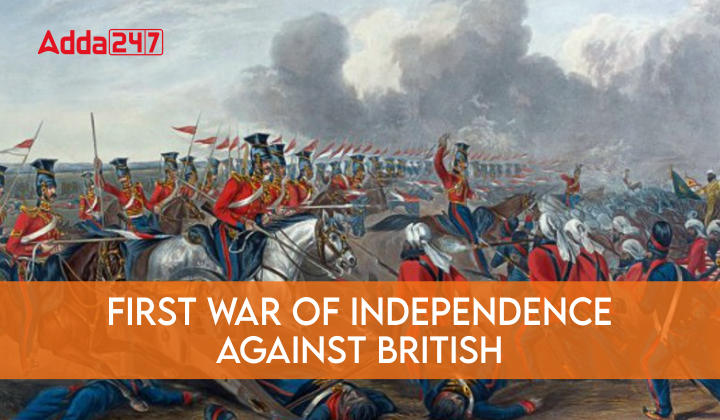The first war of Independence, commonly known as the Sepoy Mutiny or the Indian Rebellion of 1857, stands as a significant milestone in India’s long and challenging journey towards liberation from British colonial rule. Spanning from 1857 to 1858, this uprising marked the first organized attempt by Indians to cast off the shackles of British oppression and regain control of their homeland.
Immediate Reason for First War of Independence
The main reason for the First War of Independence was a new rifle called the ‘Enfield’. Soldiers had to bite off a part of the rifle’s bullets before using them. Indian sepoys believed that the cartridge was greased with either pig fat or made from cow fat which was against the Hindu and Muslim sentiments. This was a flashpoint to enrage the soldiers against the British. This was like a spark that started the big fight against the British in 1857.
Causes of First War of Independence
The following reasons five rise to First War of Independence:
- Social Causes: Indian people were treaty badly by the British, who didn’t let them fix with Europeans. They also interfered with Indian religious and cultural practices, causing a lot of pain and suffering.
- Political Causes: The British took control of lands and power from Indian rulers like Nawabs and Zamindars. They used unfair policies like taking over states and territories which made these rulers angry and want to fight back.
- Economic Causes: The British imposed heavy taxes which made the lives very hard.
- Military Factors: There was a new rule that soldiers in the Bengal Army had to serve wherever they were told, even outside of India. The soldiers were worried their sons would face the same fate. This made them angry at the British rulers.
Impact of First War of Independence: Revolt of 1857
The revolt of 1857 had a significant impact. It made the East India Company look weak and incapable of managing India. The biggest change was the Government of India Act in 1858. This law abolished the British East India Company’s control and started the British government’s direct rule. This new era, known as the British Raj, let the British government govern India through their own representatives.
Causes of Failure of First War of Independence
The First War of Independence i.e. Revolt of 1857 faced several challenges that led to its failure:
- Lack of leadership: The sepoys lacked one clear leader; there were several. They also did not have a proper strategy by which the foreigner could be routed.
- Limited Resources: The sepoys lacked proper resources like weapons, funds and supplies, making it hard to sustain a prolonged struggle.
- Geographical Challenges: The sepoys were mostly limited to northern India, making it difficult to challenge British control throughout the country.
- Lack of Unity: The sepoys were not fully united. They came from different regions, backgrounds and cultures, making coordination difficult.
Important Leaders associated with the Revolt of 1857
The leaders who were associated with the revolt of 1857 are:
| Place | Name of Leaders |
| Delhi | Bahadur Shah II, General Bakht Khan |
| Lucknow | Begum Hazrat Mahal, Birjis Qadir, Ahmadullah |
| Kanpur | Nana Sahib, Rao Sahib, Tantia Tope, Azimullah Khan |
| Jhansi | Rani Laxmibai |
| Bihar | Kunwar Singh, Amar Singh |
| Rajasthan | Jaidayal Singh and Hardayal Singh |
| Farrukhabad | Tufzal Hasan Khan |
| Assam | Kandapareshwar Singh, Maniram Dutta Baruah |
| Orissa | Surendra Shahi, Ujjwal Shahi |
Find More General Studies News Here



 ODI World Cup winners full list (1975-20...
ODI World Cup winners full list (1975-20...
 Which Indian City is Known as "City of L...
Which Indian City is Known as "City of L...
 World Portuguese Language Day 2024 Obser...
World Portuguese Language Day 2024 Obser...
